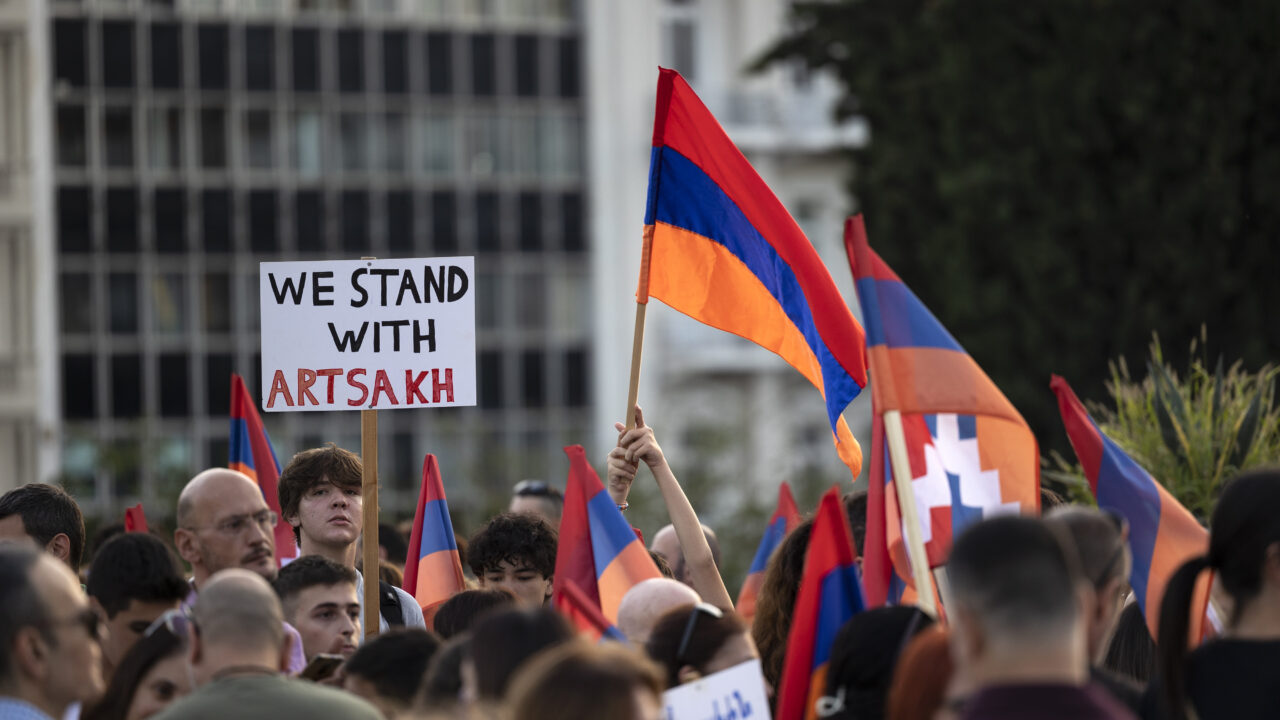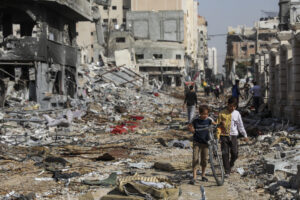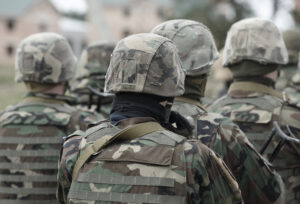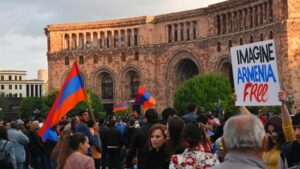There’s a Human Rights Tragedy in Asia, Too
Ethnic Armenians have fled a once-thriving democracy in Artsakh after an offensive by the authoritarian regime in Azerbaijan. Protesters take part in a rally after Azerbaijan reclaimed control of the separatist region of Nagorno-Karabakh in a blitz offensive, and forced tens of thousands of ethnic Armenians flooded over its borders, in Athens, Greece, Sunday, Oct. 1, 2023. (AP Photo/Yorgos Karahalis)
Protesters take part in a rally after Azerbaijan reclaimed control of the separatist region of Nagorno-Karabakh in a blitz offensive, and forced tens of thousands of ethnic Armenians flooded over its borders, in Athens, Greece, Sunday, Oct. 1, 2023. (AP Photo/Yorgos Karahalis)
The continuing horrors of the war in the Middle East properly occupy the world’s attention. But they have obscured another recent human rights tragedy of the highest order. Beginning on Sept. 19, Azerbaijan unleashed a military offensive that routed the inferior forces of Artsakh, an ethnically Armenian region of Azerbaijan that residents claim as an independent autonomous republic commonly known as Nagorno-Karabakh. Virtually entirely Armenian, the region remained a culturally integral part of Armenia after Joseph Stalin ceded it to Soviet Azerbaijan in 1921. It has subsequently been recognized by most governments and the U.N. as part of Azerbaijan.
Before assuming full dictatorial powers, Stalin had been the Soviet Union’s commissioner of nationalities. In this role, he cultivated the USSR’s relationship with Turkey and other successor states following the collapse and breakup of the Ottoman Empire after World War I. Delivering Nagorno-Karabakh to Azerbaijan was a calculated political move that discounted residents’ overwhelming desire for reunification with Armenia. Despite its semi-autonomous status within Azerbaijan, the Armenians of Nagorno-Karabakh were subject to routine discrimination and violence under Soviet rule.
Mikhail Gorbachev’s Glasnost reforms catalyzed Armenian attempts to bring their persecution to wider attention. In 1991, as the Soviet empire was dissolving, Artsakh held an independence referendum in which the Armenian majority voted for independence; the democratically elected leaders soon thereafter declared the Republic of Artsakh. A six-year war launched by Azerbaijan in 1988 failed to curb the independence movement; in 2016, Azerbaijan attacked again, this time finally managing to shift the front lines in its favor. Casualties were high on both sides before Moscow brokered a ceasefire. But Russia proved a fickle guarantor, and tensions remained high until another round of conflict broke out in 2020.
Since September, the vast majority of ethnic Armenians have been forced to flee the region, and Nagorno-Karabakh’s Baku-backed government says the self-declared republic will cease to exist as an independent entity by January 2024.
In October of that year, Azerbaijan attacked Armenian villages in Artsakh with substantial military aid from its ally Turkey and weapons bought from Israel. The result was the destruction of many villages, thousands of deaths and the destruction of much property and major cultural artifacts. In December of 2022, Azerbaijan blockaded and closed the Lachin corridor, the only route for the Artsakh population to get essential food, water and medical supplies, leading to starvation and suffering. The events of 2020 and after were eerily reminiscent of the Ottoman genocide against the Armenian population that commenced in 1915. Despite these disturbing historical echoes, there was little coverage of this major human rights catastrophe in the South Caucasus.
This silence has persisted into this latest round of violence. Since September, the vast majority of ethnic Armenians have been forced to flee the region, and Nagorno-Karabakh’s Baku-backed government says the self-declared republic will cease to exist as an independent entity by January 2024. Roughly 100,000 Armenians from Artsakh have fled to Armenia. They have traveled on the Lachin corridor carrying as much as they can, leaving everything else behind, a journey tragically similar to the plight of Gazans seeking safety near the southern border with Egypt. The U.N. mission in Azerbaijan reports that people making this journey endure extremely challenging conditions, often finding shelter in caves. Malnutrition, especially among the sick and elderly, is rampant. Fortunately, U.N. observers have not found major physical damage in cities and infrastructure following the Azeri invasion. Distressingly, the U.N. Karabakh mission was also told that as few as 50 to 1,000 ethnic Armenians are reported to be left in the region.
The refugees have left behind homes, jobs, religious institutions, friendship and family relationships, educational activities and opportunities — in short, their entire lives. The museums, monasteries, historical monuments and every other facet of cultural life in the region will be obliterated by the new rulers blessed by Baku. The once-thriving economies in Stepanakert, Shushi and elsewhere in the small democratic enclave will have, for all intents and purposes, disappeared from the planet. Prisoners, including top government officials and ordinary foot soldiers, face uncertain fates, including long periods of incarceration and torture.
And yet, I’ve seen and heard almost nothing in mainstream or alternative outlets about the plight of the ethnic Armenian refugees from Artsakh. One is reminded of the grotesque words of Adolf Hitler. “Who, after all,” he asked rhetorically in 1939, “today remembers the annihilation of the Armenians?”
This is a personal tragedy for me. I have visited Artsakh once, and Armenia twice, on each occasion speaking extensively in universities, high schools and public settings. The fate of Artsakh was always a topic of concern. In Artsakh, I spoke with governmental officials, legislators, diplomats and former President Georgi Petrosyan, an engaging leader with a visionary commitment to educational, cultural and political reform. I also made presentations in governmental and university settings in which I gained a deep appreciation for the vibrant culture of the young nation. (The people of the region very much consider themselves a “nation.”)
I am especially haunted by memories of a presentation I made at Artsakh State University in 2018. The student audience was engaging, hopeful and optimistic about the future. Now, that institution is gone, at least in its former form in the capital city of Stepanakert. Beyond the interruption of their studies, the future of higher education in the region is now in doubt; perhaps it will be eliminated forever. Some of these intelligent and promising young women and men in Artsakh may reclaim their lives in Armenia. Many will not, if they survive at all. It is likely that some of them have died in the recent fighting, as members of the Artsakh armed forces or as civilian casualties. Their plight leaves me heartbroken and distraught.
The plight of Artsakh should matter to Americans, even as we are preoccupied with our own profoundly serious crisis of democracy.
By any reckoning, the takeover and sweeping out of Artsakh is a massive human tragedy with effects that will be felt for decades. Survivors will struggle to rebuild their shattered lives; many will require significant mental and physical health resources in the short and long term. It’s unclear where those resources will come from. It’s also extremely unlikely that any of the exiles will be able to return to their homes. As we mourn for the victims in Israel and Palestine, so should we also mourn for the human beings in Artsakh.
The plight of Artsakh should matter to Americans, even as we are preoccupied with our own profoundly serious crisis of democracy. Artsakh had a population of 150,000, roughly the same as Pomona, California. It was a democratic country, with free and open elections, certified as such by international observers. It was a country entirely consistent with American ideals, with its own strengths and flaws, living until very recently in a state of neither peace nor war, worthy of Washington’s recognition and support.
The conquering state is its antithesis. Azerbaijan is a deeply authoritarian nation ruled by a family dictatorship with a long history of corruption. The president, Ilham Aliyev, is the son of the former president Heydar Aliyev, who was a Soviet KGB operative before the independence of Azerbaijan. Reminiscent of regimes in North Korea and Syria, the Aliyev dynasty curries favor with others that have leaders of similar bent, including Israel’s Benjamin Netanyahu. “Israel is the Jewish state and Azerbaijan is a Muslim state with a large Muslim majority,” Netanyahu said after meeting with Azeri President Ilham Aliyev in 2016. “Here we have an example of Muslims and Jews working together to promise a better future for both of us.”
Turkey is Azerbaijan’s chief sponsor on the world stage, led by its authoritarian leader Recep Erdogan, a ruler that Donald Trump reportedly admires for his “strength” and “decisiveness” in imprisoning his opponents. Perhaps inspired by Erdogan, Aliyev has pursued an extensive crackdown of civil liberties — attacking journalists, human rights advocates and others deemed threatening to the government. These people routinely face harassment, violence and imprisonment. The prospects for Armenians in Baku-controlled Artsakh are grim, at best. Americans should be deeply concerned with all of this and take every step to ensure that a massive destruction of Armenian lives does not occur. Azerbaijan, like Turkey, continues to officially deny that 1.5 million Armenians were killed by the Ottoman Turks between of 1915 to 1923 in the first genocide of the 20th century.
Could history repeat? I do not doubt that both Erdogan and Aliyev would like to make further incursions into Armenia proper. This is certainly the fear of Armenians and diaspora communities throughout the world. I have heard it expressed in Armenia, in Artsakh and in the Armenian communities of Los Angeles and Prague (which is home to a small but vibrant Armenian community.)
Choosing democracy over authoritarians should be the easiest choice America can make in its foreign policy. That choice requires not only words, but action. As long as oil partnerships grease the cozy relationship between Washington and Baku, Americans should take to the streets and force attention to the matter. The embassies and consulates of Azerbaijan and Turkey should be regular targets of protest, and we should demand far more media coverage of our allies’ actions in the region. We should pressure our representatives to work more aggressively to help Armenia and ethnic Armenians. This includes making foreign and military aid to Turkey and Azerbaijan conditional, and pressuring Israel to rethink its own cozy and morally disheartening relationship with Azerbaijan. There must never be another Armenian genocide.
Your support matters…Independent journalism is under threat and overshadowed by heavily funded mainstream media.
You can help level the playing field. Become a member.
Your tax-deductible contribution keeps us digging beneath the headlines to give you thought-provoking, investigative reporting and analysis that unearths what's really happening- without compromise.
Give today to support our courageous, independent journalists.






You need to be a supporter to comment.
There are currently no responses to this article.
Be the first to respond.